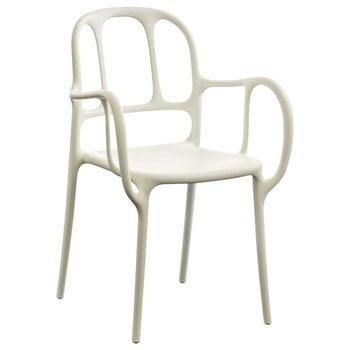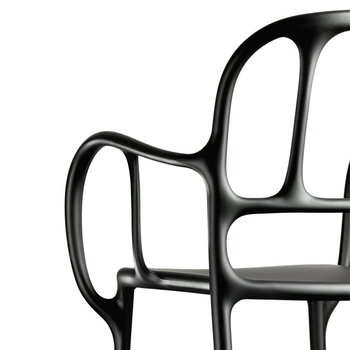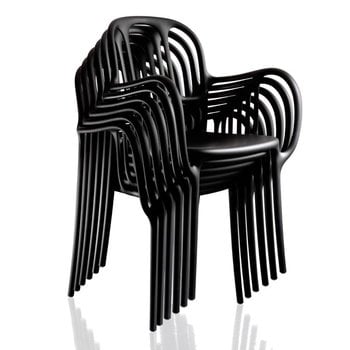The Milà chair from Magis is designer Jaime Hayòn’s first plastic product. With a gas-assisted injection moulding technique Hayón was able to create a plastic chair that wouldn’t have been possible to achieve with traditional materials such as wood. Elegant Milà stands out with its organic and dynamic shapes, characteristic to Catalan modernism. The lightweight chair features slender legs and ornamental back and armrests that look lovely both indoors and outdoors.
Mila chair, white
Magis
Description
The Milà chair from Magis is designer Jaime Hayòn’s first plastic product. With a gas-assisted injection moulding technique Hayón was able to create a plastic chair that wouldn’t have been possible to achieve with traditional materials such as wood. Elegant Milà stands out with its organic and dynamic shapes, characteristic to Catalan modernism. The lightweight chair features slender legs and ornamental back and armrests that look lovely both indoors and outdoors.
Product details (7)
- Colour
- White
- Width
- 55 cm
- Depth
- 54 cm
- Height
- 84.5 cm
- Seat height
- 46 cm
- Material
- Mixture of polypropylene and glass fibre
- Notes
- Stackable. Suitable for outdoor use.
- Product ID
Designer
Jaime Hayón (b. 1974) grew up in Madrid where he got influenced by the local culture of skateboarding and graffiti painting. He studied industrial design in Madrid and later on in Paris. In 2001 he founded his own studio where and since then he has developed to a acknowledged designer. His works have been noted globally in distinguished medias. Hayón has worked for several companies including Magis, &Tradition, Fritz Hansen and Swarovski. Today Hayón has offices in Italy as well as in Spain and Japan.
View all productsReviews (0)
Sustainability
The Product Sustainability Framework, our criteria of sustainable design, helps you find the most sustainable products in our selection. Read below which sustainability criteria this product has met.
Working conditions & labour 9/9
-
Equal opportunities for all employees
-
Commitment to UN Global Compact, fair compensation for all employees
-
Corporate responsibility requirements defined and communicated for suppliers
-
Systematic work for improved inclusion and well-being in the workplace
-
Transparent supply chain
-
Suppliers' compliance to a code of conduct ensured
-
Direct suppliers audited and certified
-
Compliance to the UN Guiding Principles on Business and Human Rights ensured in the supply chain
-
Support for community involvement in the supply chain
Eco-friendly production 7/9
-
Fair and resource-wise water-use in production
-
No incineration or landfilling of returned items
-
No use of endangered species as materials
-
No direct environmental emissions or waste (excl. GHGs) from production
-
Material-efficient and ecological packaging
-
Positive impact on nature’s well-being through operations that regenerate natural ecosystems
-
No potentially harmful chemicals used in own production
Climate impact 5/8
-
Company's direct greenhouse gas emissions identified and commitment to reduction
-
Product's carbon impact identified and commitment to reduction
-
Guidance on energy- and eco-efficient use of the product
-
Contribution to climate initiatives beyond the brand’s direct operations
-
100 % renewable energy in own production and operations
Sustainable materials 6/6
-
Sustainable and long-lasting material choices
-
No harmful or hazardous substances
-
Responsible raw material sourcing and production
-
Materials suited for circularity: monomaterials, recyclable finishings, renewable or recycled contents etc.
-
Ecological materials: natural, biodegradable, recyclable or recycled contents
-
Outstanding materials in terms of innovativeness, responsibility, sustainability and circularity: local production or sourcing, 100 % recycled content, C2C-certification etc.
Circular design 4/5
-
High aesthetic quality promoting long-term use of the product
-
Technically durable product design and material choices
-
Design for enduring life-long quality
-
Design and support for product maintenance, repair and upgradability











